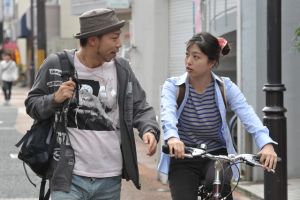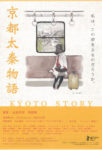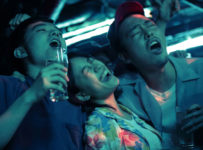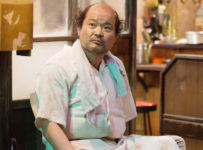Uzumasa Daiei was one of the most famous shopping arcades in Kyoto, housing the now defunct Daiei Studios, producers of such films as Rashomon with Akira Kurosawa and the monster-mashes of Gamera. Now it forms the focal point of an experiment, combining the efforts of some up and coming filmmakers with some veterans in the field. Working with Ritsumeikan University’s College of Image Arts and Sciences and Shochiku Co., Ltd., one of the worlds oldest film studios, directors Yoji Yamada (About Her Brother, the opening night film of this year’s Japanese Film Festival) and his protégé Tsutomu Abe (Happy Family Plan) have guided this simple love story into cinemas across the world.
Using a combination of real conversations with local residents and a screenplay by Yoji Yamada, Kyoto Story weaves a beautifully simplistic tale of love in a small town. Kyoko (Hana Ebise) is a librarian (yay!) who is fairly settled with the idea that she will live in her small town with her laundromat owning parents until her dying days. However, she soon finds that her affections are torn between boyfriend and aspiring stand-up comedian (USA (EXILE)) and a bumbling visiting academic from Tokyo (Sataro Tanaka) who has fallen head over heels in love with Kyoko. She must decide which path she will follow, and where her heart lies.
The title Kyoto Story naturally brings to mind the work of Yoshijo Ozu (Tokyo Story). In many of his films, Ozu explored the disintegration of traditional family life in post-war Japan. However, in the wake of the economic downturn of the 1990s, many Japanese filmmakers (including Tsutomu Abe) returned to reflect upon the importance of the family unit and the comforting joys it brings (as he so aptly did in Happy Family Plan). So too is the case with Kyoto Story, a film that gently takes us through the lives of two families and reminds us all that there is no place like home. Kyoko’s decision about deciding whether to leave the flock is reminiscent of Ozu’s Late Spring, where everybody seemed to have an idea of what was best for its lead character Noriko. Kyoko’s ultimate decision shows that the men around her are far more dependent on her than she will ever be on them.
There is little about Kyoto Story that jumps out and screams at you of its brilliance, but it really isn’t a jumpy-out-screamy kind of film. It is a sweet story that is as much a nostalgic love-letter to a bygone era as it is about the love triangle at the heart of the film. It is a rare thing that a film captures the slow vibe of a place yet simultaneously manages to be entertaining and charming all in one neat bundle. Kyoto Story is that bundle, a joyous one at that.
Kyoto Story is screening at the 14th Annual Japanese Film Festival with Eriko Onishi’s Wish You Were Here. The festival kicks off in Sydney on 22 November 2010 and runs through to 28 November. The Melbourne leg is on from 2 to 7 December. Check the JFF site for other states.







No Responses